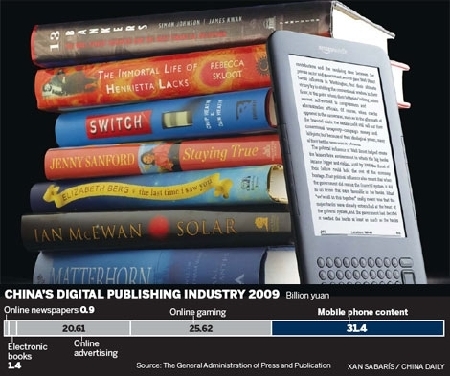Technology
Electronic words
Updated: 2010-12-10 14:25
By Yang Ning (China Daily European Weekly)

China is heading toward being the world's largest e-reader market as more publishers embrace the digital age
The move to the digital age has transformed the business model of publishing, says Zhou Xuelin, president of China Europe International Business School (CEIBS) Publishing Group. "The traditional publishing industry is struggling desperately with the rise of new digital and information technologies, thus integration with the emerging technology, in one way or another, seems to be the only way out," Zhou says. Founded in 2008, the group is a joint venture between CEIBS and the Shanghai-based Chengwei Ventures. In addition to traditional ways of publishing via books, magazines and journals, the group is experimenting with emerging digital technologies to meet the increasing demand of the corporate world for management training. It has developed more than 200 management courses for business executives, says Zhou. China's digital publishing industry brought in revenues of 79.9 billion yuan (9.07 billion euros) by the end of 2009, up 50 percent from the previous year, and exceeding that from traditional publishing for the first time, the General Administration of Press and Publications (GAPP) says.
"Digitization is pushing the publishing industry into a new historical period and offering unprecedented opportunities," says Sun Shoushan, deputy director of GAPP.
Display Search, a global market research and consulting company, forecasts China will overtake the United States as the world's largest e-reader market before 2015 by virtue of the country's large population.
Today, people have virtually free access to an unlimited volume of information through the Internet and other electronic means. As a result, an increasing number of people turn to the Internet or digital reader for important information.
Zhou says the negative impact of such a change in reading behavior is beginning to show: Both subscription and advertising for newspapers and journals for example, which have been the two major sources of revenue for the traditional publishing business, are falling rapidly at a speed of more than 25 percent annually.
Advertisers are directing budgets toward channels that are able to generate more qualified sales leads. Except for the market leaders, most Chinese magazines are having an extremely difficult time in 2010, he says.
However, because the group is connected with the business school, Zhou found a way forward: The e-learning market.
"As we are embarking upon a new wave of teaching and learning methodologies, e-learning is becoming - more than ever before - a viable alternative, and increasingly an integral component of the educational development process," he says.
Forecasts from US-based Global Industry Analysts indicate the global e-learning market will be a $52.6 billion (39.77 billion euros) sector by 2010, with the US alone accounting for 60 percent.
In comparison, the adoption of e-learning as an important complement to traditional face-to-face classroom learning still lags far behind in Asia. However, it is expected the Asian market will grow by 25 percent to 30 percent annually in the next decade, says Zhou.
"This provides a huge opportunity for our group. Despite being a new entrant in this market, we are already well established as a leading e-learning provider in the field of management," he says.
Many top business schools around the world have their own publishing houses, such as Harvard Business School Press and Wharton Business School Press. They are well established and have attracted top professors to produce influential management titles.
In China, compared with other business schools, CEIBS is the only business school with an independent publishing house.
CEIBS Publishing is more focused on "Chinese practice with a global perspective", Zhou says.
With China playing an increasingly significant role in the global economy, China-related business cases and studies are very popular in the global market.
"Our group's proposition is that we are the one who understands Chinese business practices," Zhou says.
E-paper

Ear We Go
China and the world set to embrace the merciful, peaceful year of rabbit
Preview of the coming issue
Carrefour finds the going tough in China
Maid to Order
Specials

Mysteries written in blood
Historical records and Caucasian features of locals suggest link with Roman Empire.

Winning Charm
Coastal Yantai banks on little things that matter to grow

New rules to hit property market
The State Council launched a new round of measures to rein in property prices.
